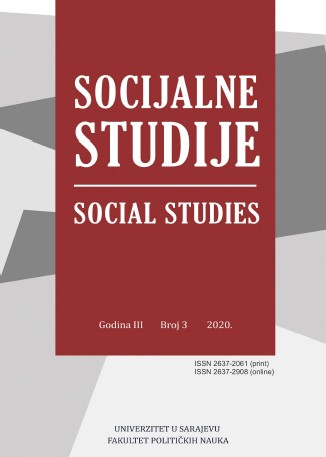KRITIČKI OSVRT NA PROCES (DE) INSTITUCIONALIZACIJE U FEDERACIJI BOSNE I HERCEGOVINE
A CRITICAL REVIEW ON THE PROCESS OF (DE)-INSTITUTIALIZATION IN THE FEDERATION OF BOSNIA AND HERZEGOVINA
Author(s): Nedreta Šarić, Suada BuljubašićSubject(s): Human Rights and Humanitarian Law, Government/Political systems, Welfare systems, Politics and society, Health and medicine and law, Family and social welfare, Welfare services, EU-Approach / EU-Accession / EU-Development
Published by: Fakultet političkih nauka - Univerzitet u Sarajevu
Keywords: De-institutialization; transformation; reforms; users;
Summary/Abstract: Necessary reforms in the process of joining the European Union impose the obligation to harmonize domestic regulations with international conventions and European standards and to ensure the conditions for achieving the highest level of human rights protection. Therefore, numerous strategies, policies, action plans and other documents have been adopted, which emphasize the commitment of the state to work through reform processes in the field of health and social protection to create conditions in order to improve the protection of mental health. Within the reforms implemented in the social and health sector, deinstitutionalization occupies a special place. The aim of this research is to determine the extent to which the long-term goals stated in the Strategy for Deinstitutionalization and Transformation of Social Welfare Institutions in the Federation of Bosnia and Herzegovina (2014-2020) have been achieved. In order to reach the set goal, it was necessary to investigate the beginning of the development of institutional care, give an overview of current institutions and conduct quantitative and qualitative research in institutions where people with mental disabilities are cared for. The research was conducted in three institutions in the Federation of Bosnia and Herzegovina. An analysis of the annual Work Reports for the period 2014-2019 was performed in all institutions, and a survey was conducted in one institution with employees and management representatives. The following methods and techniques were used in the research: historical method, content analysis method, description method, induction and deduction method, comparison method and interview. The research findings show that the number of institutions with a large number of beneficiaries is increasing, that there is transinstitutionalization of beneficiaries, that the necessary conditions have not been created, primarily related to creating appropriate services and support in the local community for beneficiaries after leaving the institution. However, research findings show that some institutions contribute to the process of deinstitutionalization through their organization of work and opening to the local community, but only to its beginning, because beneficiaries are still delayed due to the impossibility of leaving. It must be given more attention in the coming period.
Journal: Socijalne studije
- Issue Year: III/2020
- Issue No: 3
- Page Range: 29-54
- Page Count: 26
- Language: Bosnian

